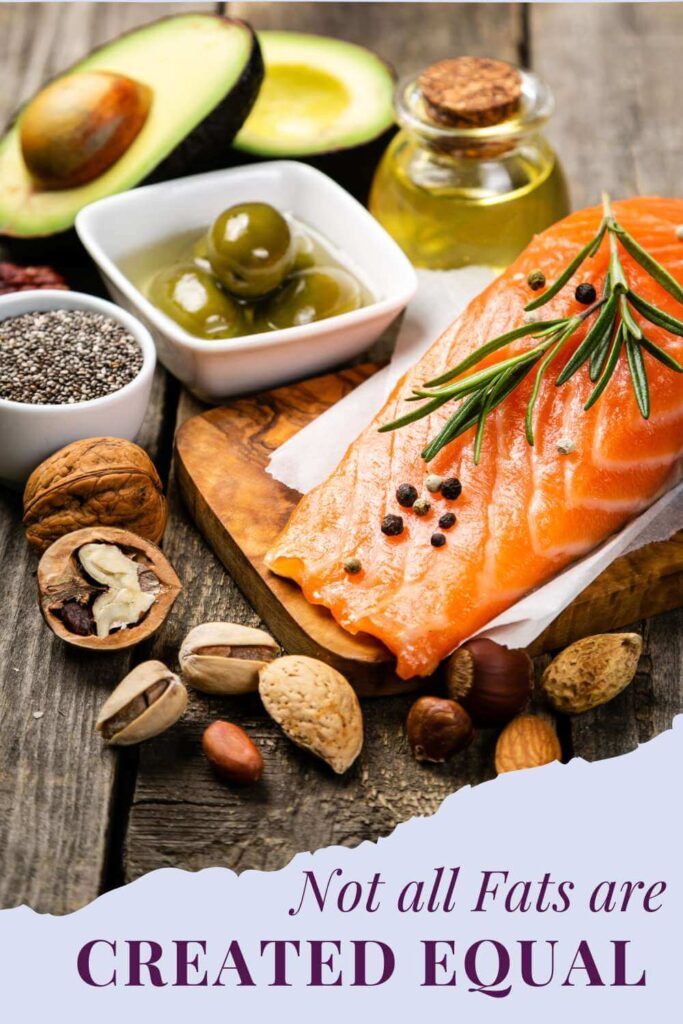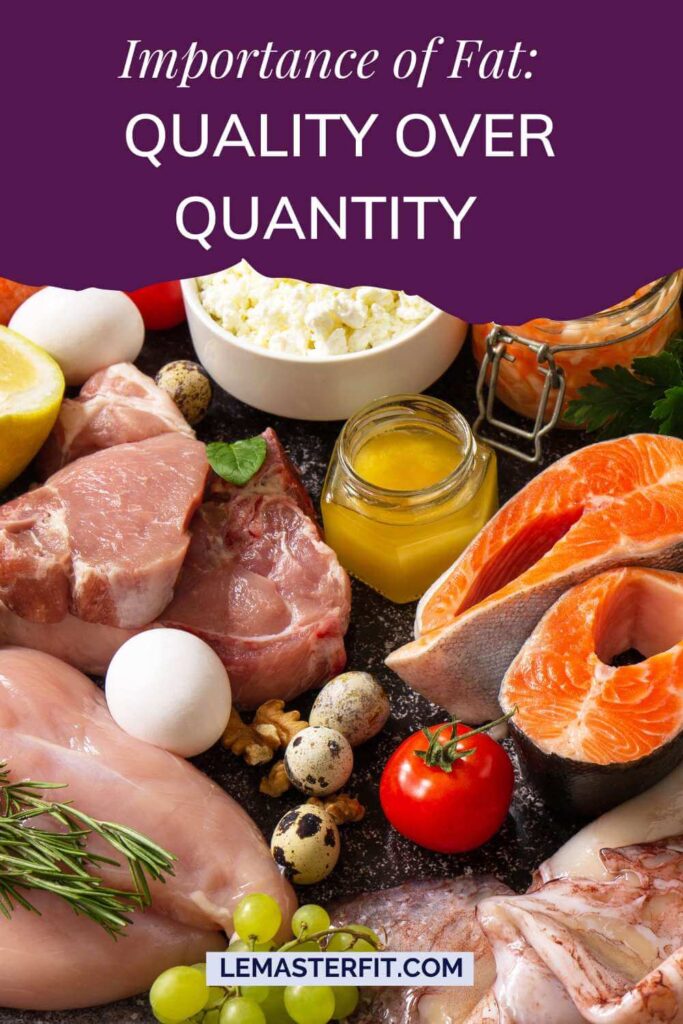Many people believe fats are the enemy. However, natural and healthy fats, like fats found in animal products, offer many health benefits when consumed in moderation. Fat is important for different functions in the body. Fat is a major energy source for the body aside from the energy we get from carbohydrates. Our body needs fat to absorb and use vitamins from the food we eat and so much more.

What was the ‘War on Fat’?
Around 30 years ago, the American Dietary Guidelines essentially declared a ‘war on fat’. They thought all fats lead to obesity, heart disease, increased chance of diabetes, and thought, people need to eat less fat. Many think this was largely influenced by the sugar industry.
The ‘War on Fat’ declared that fat was bad for your health. Instead of suggesting a diet of eating healthy fat and foods in moderation, the Dietary Guidelines promoted more carbohydrates in the diet including processed carbohydrates! Studies have shown that eliminating or reducing fat from the diet doesn’t lower your “bad” cholesterol or your chance of heart disease. The reason is that processed carbohydrates have a high glycemic index. Food with a high glycemic index nearly doubles the risk of heart disease and the chance of diabetes!
These scientists considered all fat the same and were convinced that fat would cause everyone to develop heart disease. Don’t be afraid of eating fats. They are vital to the body. I used to struggle with eating fats and if that is a challenge for you, click on this link and schedule a call with me!
What is Fat?
Fats are a macronutrient that our bodies need to carry out basic functions and healthy lifestyles. Our cells use fats to build strong membranes and our bodies can absorb certain vitamins and minerals only when fat is present in the diet.
Natural fats are found in a variety of animal products, including meat, fish, eggs, and dairy. They are also found in some plant-based sources, such as nuts. These fats are an essential part of a healthy diet and provide the body with energy, support hormone production, and aid in the absorption of fat-soluble vitamins (A, D, E, and K). These vitamins and minerals support the immune system, muscular system, metabolism, heart, skin, and brain.
Role of Fat in the Body
Fat has several roles in the body. Fat provides energy to the body and helps support the functions of the cells and tissues. Plus, fat protects our organs and acts as a bit of a cushion to prevent damage to the organs and produces important hormones to regulate different parts of the body.
Natural, healthy fats; those found in meat, fish, olives, avocados, are healthier than processed foods. My rule of thumb is the less food manufactured in a lab, it’s likely better for my body and easier for my body to use.
Health Benefits of Healthy Fats
1. Improved Heart Health
Contrary to popular belief, consuming healthy fats doesn’t increase the risk of heart disease. In fact, studies have shown that diets rich in natural fats improve heart health by reducing inflammation, lowering blood pressure, and improving cholesterol levels.
2. Weight Management
Eating healthy fats aid in weight management. When consumed in moderation, healthy fats can help you feel fuller for longer, reducing the likelihood of overeating or snacking on unhealthy foods.
3. Improved Brain Health
Healthy fats are essential for brain function and can help improve cognitive function, memory, and focus. Fats are important for the development of the nervous system in children. Our brain is 60% fat so don’t deprive your body’s most vital organ or it primary nutrient.
Why We Love Animal Fats
Animal fats are healthy fats found in meat, dairy, eggs, and even good old-fashioned butter. Especially from grass-fed animals, – provides incredible nutrient quality including all fat-soluble vitamins (ADEK and B12, conjugated linoleic acid (CLA), choline, and several other necessary fatty acids the body needs). CLA is anti-inflammatory and supports the immune system, but it also helps maintain healthy metabolism.

Studies show there is no correlation between eating animal fats and heart disease. There is, however, double the increase of heart disease on diets that contain high sugar, starchy processed foods. It’s important to remember that when you eat animal fats found in something like steak, you are also getting the protein and all the essential vitamins and minerals which can boost health and leave your belly full. Animal fats are a mix of saturated fats and the good unsaturated fats known to benefit heart health. Fish, dairy, milk, butter, duck fat and even red meat fall into this category! Not to mention, these fats also add a rich flavour element to any meal!
When fats are replaced with carbohydrates, good cholesterol drops and bad cholesterol increases. Replacing saturated fats with polyunsaturated fats also increases your chance of heart disease. Eating animal fats vs. processed seed oils has even shown to increase the chance of survival after someone has a heart attack!
Fat from fish is also an incredibly powerful healthy fat for your body. Fish provide essential omega-3 fatty acids which improve brain and heart health.
Olive oil and avocado contain omega-3 fatty acids and low concentrations of the omega-6 fatty acid, which means it doesn’t negatively impact your body compared to seed oils. The problem is that these fats oxidize quickly and especially seed oils, can trigger inflammation throughout the body. Olive oil also contains vitamin E and oleic acid, which helps reduce inflammation in the body. Avocado oil also contains carotenoids.
Why We Avoid Seed Oils

What are Seed Oils
- Canola (rapeseed oil)
- Corn Oil
- Cottonseed oil
- Grapeseed oil
- Peanut oil
- Rice Bran oil
- Soybean oil
- Sunflower oil
Issues with Seed Oil
Seed oils negatively impact your health because they are extremely high in Omega-6 fats. For more info on omega-6 and seed oils, check out this article. Our body needs omega-6. The quantity of omega-6 in seed oils contain much greater quantities than our body needs. High levels of omega-6 causes inflammation, obesity, heart disease, and can lead to instability in cell membrane from oxidation. Too much can also increase the chance of cancer formation.
Seed oils are heavily processed. Processing damages the molecules. When this damage occurs, the molecules are unstable and creates oxidized molecules which leads to the harmful effects in your body. When these oils are oxidized through processing and during cooking, the oxidized molecule is then in your body and can lead to health problems. Studies even go so far to claim they are in fact toxic based on how much you consume and how your body reacts.
Highly processed foods are produced with seed oils because they are cheap.
What’s the Take Away
Healthy fats are an essential part of a healthy diet and offer many health benefits. Eating natural fats can improve heart health, aid in weight management, and support brain function. However, it’s important to avoid processed trans fats, and seed oils which can have negative effects on health. So enjoy natural, healthy fats in moderation as part of a healthy and balanced diet! If you have questions, set up a call with me here.